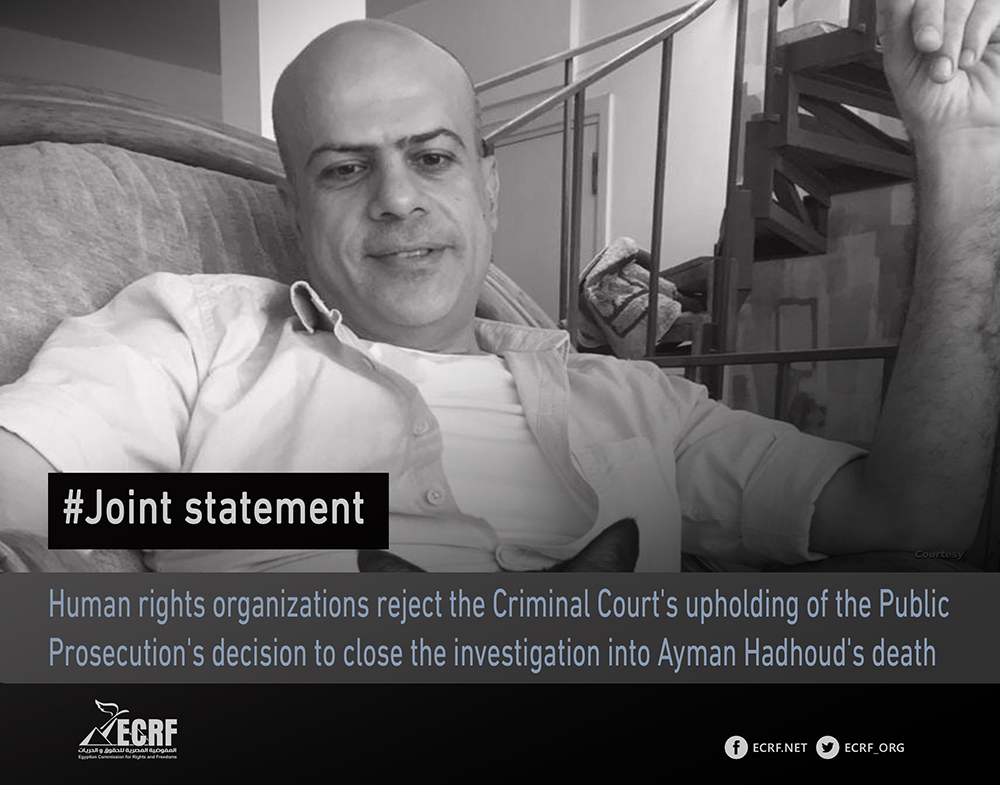The undersigned human rights organizations condemn the decision issued by Circuit 28 of the New Cairo Criminal Court on 23 June 2022 to reject the appeal submitted by the Association for Freedom of Thought and Expression (AFTE) and the Egyptian Initiative for Personal Rights (EIPR) against the Public Prosecution’s decision to close the investigation into the death of economic researcher Ayman Hadhoud. The organizations call for resuming the investigation and responding to the defence’s requests, especially as there is evidence of a possible “unnatural” death of Hadhoud.
On 19 May 2022, AFTE and EIPR submitted a request to the Public Prosecution asking it to investigate the case by obtaining recorded footage from surveillance cameras installed in several places that had been frequently visited by Hadhoud. These places included the forensic medicine unit at the Mental Health Hospital in Abbasiya, where Hadhoud was detained, building 15A at Maraashly Street in Zamalek, where Hadhoud was arrested, according to a statement by the Egyptian Ministry of Interior, and the vicinity of the Qasr al-Nil and Amiriya police stations. The request came after Omar Hadhoud filed a lawsuit against the director of the Mental Health Hospital in Abbasiya, the head of the forensic medicine unit at the hospital, and anyone involved in the death of his brother Ayman. However, the Second Nasr City Prosecution issued a decision on 1 June 2022 stating that there was no reason to file a criminal lawsuit in Case No. 738 of 2022 (Second Nasr City Administrative Court), regarding Hadhoud’s death.
On 23 June, the court upheld the decision to close the investigation into Hadhoud’s death, raising more concern about the reasons and motives for closing the case without seriously considering the evidence and suspicions presented by the defence team.
The defence lawyers drew the court’s attention to the lack of impartiality of the Public Prosecution during the investigations, as it issued a press statement denying the existence of a criminal suspicion in Hadhoud’s death before the investigation was completed. A joint statement released by human rights organizations on 14 April tackled the same issue.
The undersigned organizations also denounce the Public Prosecution’s reliance in its decision on the opinion of one forensic doctor who attributed the cause of Hadhoud’s death to a chronic heart condition. The prosecution did not consult another doctor, nor did it describe Hadhoud’s condition more accurately, or even determine the nature of the organic disease that led to his death. The organizations also condemn the Public Prosecution’s failure to inform Hadhoud’s family of the developments of the investigation, and its rejection to give them a copy of the investigation papers. The prosecution allowed only one lawyer to access the investigation papers for only one hour, in violation of Article 52 of Law No. 17 of 1983, amended by Law No. 147 of 2019 , which states that lawyers have the right to review case papers and the prosecution and courts should facilitate the lawyers’ access to information.
Hadhoud’s family lost contact with him on 5 February 2022, before announcing on 9 April the news of his death, after they received a call from a police officer informing them of his death, and asking them to collect his body from the mortuary of the Abbasiya Mental Health Hospital.
We condemn the court’s decision to uphold the closure of the investigation into Hadhoud’s death. We renew our call for a serious and transparent investigation into the case, and warn of the danger of the judicial authorities’ participation in promoting impunity, especially in cases of extrajudicial killings.
Undersigned organizations:
● Association for Freedom of Thought and Expression (AFTE)
● Committee for Justice (CFJ)
● El Nadeem Center
● Egyptian Front for Human Rights (EFHR)
● Egyptian Initiative for Personal Rights (EIPR)
● Cairo Institute for Human Rights Studies (CIHRS)
● Egyptian Commission for Rights and Freedoms (ECRF)
Joint statement: Human rights organizations reject the Criminal Court’s upholding of the Public Prosecution’s decision to close the investigation into Ayman Hadhoud’s death

